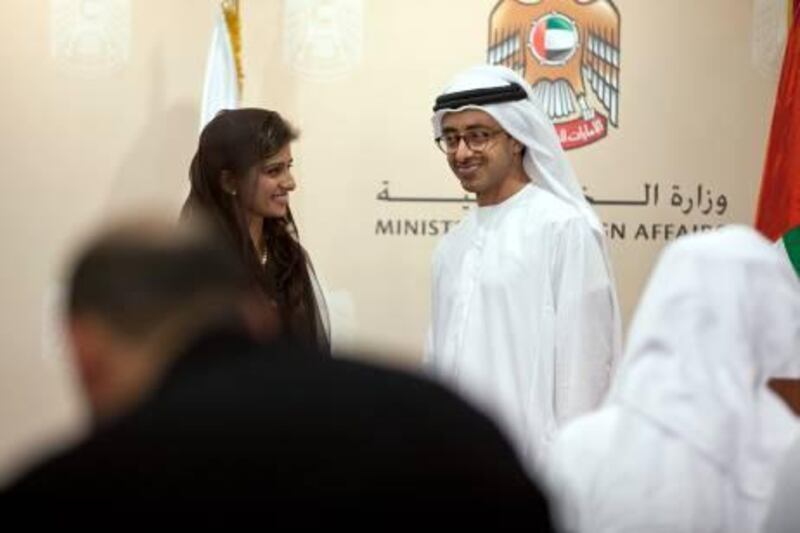ABU DHABI // The international community must take responsibility for security in the Gulf and not leave it to countries in the region, the Minister for Foreign affairs has warned.
"I want to define the UAE's stance: it is clear the security of the Gulf is part of international security and it is impossible to separate [the two]," said Sheikh Abdullah bin Zayed.
"The Gulf's security is part of other countries' security in terms of the stability of oil prices and energy flow."
The minister was speaking at a press conference with the Pakistani foreign minister Hina Rabbani when he was questioned over US plans to increase its forces in the region after its withdrawal from Iraq.
Those plans come amid heightened tension over the Gulf. Last month Iran threatened to close the Strait of Hormuz in retaliation for international sanctions. Thirty per cent of the world's crude oil supply is exported through the waterway.
Experts say such threats by Iran have added a premium of US$10 a barrel to the price of oil.
But the foreign ministry has consistently said tensions with Iran should be resolved through diplomatic dialogue and not by force.
Sheikh Abdullah thanked the Pakistani government for supporting a recent vote by the UN General Assembly to stop the violence in Syria.
"Even though it failed, we still thank you for your support," he said.
Earlier, a joint ministerial meeting agreed to launch a campaign promoting a "soft" image of Pakistan, to counter its growing reputation for militancy.
Mrs Rabbani called the campaign "an outreach" for the 1.2 million Pakistani citizens in the UAE.
"You are exposed far too much to the hard image of Pakistani culture and we want to give an experience of the real [Pakistan] in art, culture and many other areas," she said.
Sheikh Abdullah was also asked what both countries were doing to ensure Pakistani workers were not trafficked or having rights violated.
"The UAE is a country which celebrates its rich diversity of guest workers from all around the world," he replied.
"It is challenging … to get everyone here and make their presence as safe and productive as possible. There are incidents that we face problems with but usually we try very vigorously [to solve them]."
The two countries have also discussed speeding up a free-trade agreement between the GCC and Pakistan. Mrs Rabbani said the agreement would help Pakistan progress with internal reforms.
A joint investment company is planned and the two countries' chambers of commerce are planning a joint business council, which will hold its first session in April.
Sheikh Abdullah said the ministry had asked Pakistan to study obstacles for UAE investors, particularly security issues. Trade between the two in the past five years grew from $4.2 billion (Dh15.42bn) in 2006 to $6.7bn in 2010.
"There is no doubt that the relationship between Pakistan and the UAE is historical," Sheikh Abdullah said. "This committee serves to strengthen the relationship in the field of energy, telecommunications, investments and increasing commercial revenues."
Mrs Rabbani added: "Pakistan and UAE have a historical relation and common religion. Also, more importantly, a common vision of the future of this region.
"We have contributed a great deal to fight militancy and extremism.
"Pakistan is the country that deserves the world's attention in this regard. So we call the world to look at Pakistan in a different light than they used to."







